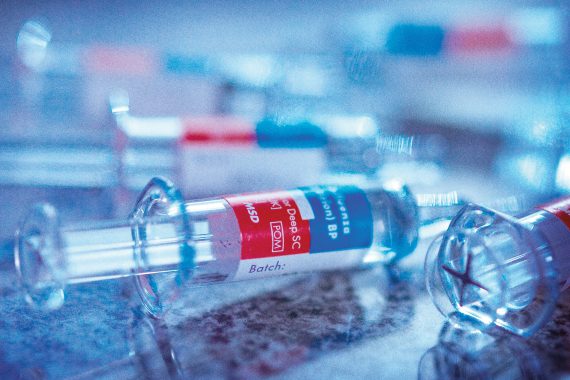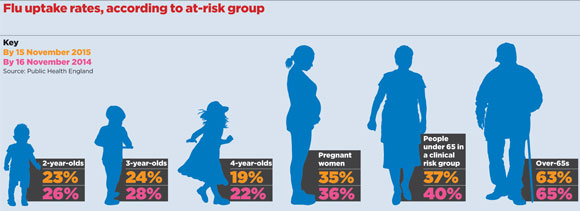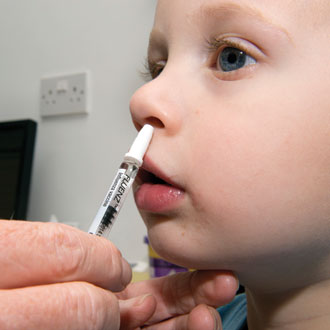Flu vaccine campaign becoming ‘a shambles’


This year’s flu vaccination programme is ‘likely to be a shambles’, leaving vulnerable patients at risk and jeopardising practice funding.
This is the warning from GP leaders, after official figures revealed that GP practices are, on average, administering 100 fewer vaccines than at the same stage last year.
The RCGP issued a statement warning that surgery fridges were ‘full of unused vaccines’, saying the low uptake was ‘extremely alarming’ and would put the NHS under greater pressure this winter.
The college puts this down to an ‘incredibly mild’ November, which has meant patients are not turning up in the usual numbers.
But local GP leaders have also pointed the finger at bad press over the effectiveness of the flu vaccine last year, and at the new pharmacy flu vaccination scheme, amid reports that pharmacists are offering to give patients their jab and discouraging them from having it at their GP practice.
The scheme – which pays pharmacists to vaccinate patients in clinical risk groups, such as the elderly and those with long-term conditions – is simply ‘confusing’ patients, they add.
As a result, the GPC is holding discussions with the Department of Health in a bid to alleviate the problems caused by the new scheme and is attempting to win compensation for practices who have lost income from wasted vaccines.
Rates falling
Public Health England’s figures show that, as Pulse went to press, only 63% of over-65s had been vaccinated, compared with 65% at the same stage of the flu season last year, while rates for all other at-risk groups are also down.
Only 23% of 2-year-olds and 24% of 3-year-olds have been vaccinated, down three and four percentage points respectively.
Professor Simon de Lusignan, director of the RCGP Research and Surveillance Centre and a GP in Guildford, Surrey, says: ‘In my practice, we appear to be giving fewer vaccines and have now slowed the ordering of vaccines because our fridges are full.’
He adds: ‘The reasons for this are unclear, but it is possible that perceptions of lower vaccine effectiveness last year may have influenced people.’
There were reports that last year’s vaccine was only effective in 3% of cases. However, this was later revised to 34% – a rate that Professor de Lusignan said was ‘reasonable’.
Some GPs lay the failure to communicate this information at the Government’s door.
Dr Peter Scott, chair of Solihull LMC, says the flu vaccination campaign this year is ‘likely to be a shambles’.
He says he has seen ‘nothing at all being put about by the Department of Health promoting flu vaccination’ and that headlines about the vaccine’s low rate of effectiveness last year ‘didn’t help’.
But the main problem for many GP practices is that they are now in direct competition with pharmacies for vaccinating at-risk groups.
Dr Scott says: ‘The DH says it’s committed to getting the maximum possible coverage and they think the pharmacy contract is the right idea, but the pharmacies are competing with us for the low-hanging fruit – those patients who are keen to have the jab as soon as possible.’
Dr Andrew Green, chair of the GPC clinical and prescribing subcommittee, says the GPC is ‘working hand in hand with the RCGP to ensure the DH and NHS England are aware of the problems, both clinical and organisational, that the late introduction of the pharmacy flu scheme has caused’.

Poaching
This comes amid warnings from local leaders that pharmacists are poaching patients from GP practices.
Doncaster LMC medical secretary Dr Dean Eggitt says: ‘Three of our GP practices complained to the LMC about it – that pharmacies have been taking patients ad hoc even though they’ve got GP appointments, and they’ve said “we’ll do the vaccine now and you go back and cancel your appointment”.’ However, Dr Eggitt adds that in most cases, this has not been malicious, and the pharmacies have simply been following instructions from NHS England.
He says: ‘Pharmacy managers have been told, “please help out your local practice by doing lots of flu jabs, and you’ll be helping GPs by doing this”.’
Chief officer of Doncaster Local Pharmaceutical Committee (LPC) Nick Hunter explains: ‘We understand this service has been commissioned nationally because GPs are under increasing pressure and keep telling commissioners they can’t do more.’
Elsewhere, Cleveland LMC says it has had reports of pharmacies contacting care homes to offer the flu jab, while in Gloucestershire, LMC lay secretary Mike Foster says: ‘We have various reports within our own area that we are working on with the LPC, and I gather the GPC is putting together a dossier of things that are going wrong, which they can then discuss with NHS England.’
This situation has left some practices with unused surplus vaccination stock for which they cannot obtain refunds.
Dr Green is currently calling for compensation for practices that are left with surplus stock as a result of the scheme, but he adds this ‘probably depends on [the DH] adopting a position based on morality rather than legality’. Pulse published a strongly worded letter from Elaine Smith, a practice manager in Bristol, to NHS England chief executive Simon Stevens last month, asking him what she should do with the 350 unused vaccines her practice has left. She estimated that more than a million flu vaccines overall could end up ‘in landfill’ this year, costing practices some £4m.
Despite the setbacks and confusion around the start of this year’s campaign, Public Health England says it remains committed to getting 75% coverage of clinical risk groups. PHE also claims the low uptake figures may be explained by vaccinations carried out in pharmacies not being recorded in a timely way – although pharmacy bodies dispute this.
But RCGP chair Dr Maureen Baker warns: ‘These [uptake] figures are extremely alarming.
‘The drop in the number of vaccinations that we are seeing this year can only increase the risks for the frail elderly and others more susceptible to flu, as well as potentially increasing winter pressures on the NHS.’
Child flu vaccine shortage: practices forced to order from the US

Practices are being forewarned that central supplies of Fluenz Tetra, the nasal flu vaccine for childhood flu immunisations, will soon run out and that they will need to order a US version of the vaccine instead.
Public health chiefs stressed the US vaccine – FluMist Quadrivalent – is exactly the same as Fluenz Tetra. However, they advised GPs to ignore the expiry dates printed on packages of FluMist, as these will be inaccurate.
This is because the switchover has disrupted the supply schedule, causing a ‘mismatch between the actual expiry date and that printed on the packaging and labelling’, Public Health England said in the October Vaccine Update.
Instead, practices are advised simply not to use any FluMist Quadrivalent after 24 February 2016 – and that the vaccine supplier will start collecting unused stocks a month before this date ‘to help ensure that no time-expired vaccine remains in circulation’.
GPs are also advised to quarantine any unused FluMist before 24 February ‘to avoid accidental administration’.
In addition, GPs must refer to UK prescribing information – which will be included with FluMist packages – as this differs from the US information, and obtain an amended Patient Group Direction form signed off by NHS England as well as the authorising GP and prescriber.
However, vaccine administration is the same as for Fluenz, as are consent forms and recording of vaccinations.
The Fluenz supply problem is the latest in a series of shortages that has beset the childhood programme since its introduction in 2013.
Last year, GPs faced an immediate cap on how many vaccine packs they could order at the beginning of the flu season, despite PHE urging them to make sure as many children were vaccinated before Christmas because of the vaccine’s short shelf-life.
Visit Pulse Reference for details on 140 symptoms, including easily searchable symptoms and categories, offering you a free platform to check symptoms and receive potential diagnoses during consultations.









